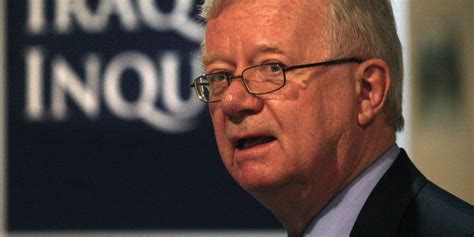A Quote by Rachel Maddow
Ridding Iraq of weapons of mass destruction. That was the whole idea, right? That‘s why we went. I am reluctant to let that fact disappear down the memory hole, because if — as the war ends, or at least starts to end — if, at this time, the history of the war is written as us going there to topple the regime of a bad man when that frankly isn‘t why were told that we were going there — Aren‘t we still at risk of making this horrific mistake again? And, aren‘t we letting the people who foisted the WMD idea on us, not many years ago, aren‘t we sort of letting them get away with it?
Quote Topics
Again
Am
Away
Bad
Bad Man
Because
Destruction
Disappear
Down
End
Ends
Fact
Frankly
Get
Get Away
Going
History
Hole
Horrific
Idea
Iraq
Least
Letting
Making
Man
Many
Mass
Mass Destruction
Memory
Mistake
People
Regime
Reluctant
Right
Risk
Sort
Starts
Still
The History Of
Them
Time
Us
War
Weapons
Weapons Of Mass Destruction
Were
Whole
Why
Wmd
Written
Years
Years Ago
Related Quotes
Change of regime with respect to Iraq had nothing to do with this; it had everything to do with the fact that Iraq had weapons of mass destruction. And at the time change in regime as a policy came into effect in 1998, it was seen as the only way to compel Iraq to get rid of its weapons of mass destruction.
The war in Iraq has been very, very expensive - partly because the Administration tried to keep the apparent costs down. But the benefits have been elusive at best - partly because the ostensible reasons for going war were unconnected with reality - no weapons of mass destruction, no connections with 9/11.
Inside the White House there were always extreme amounts of doubt about whether they should be escalating in Afghanistan. In fact, most of the president's advisers said, "This is probably not going to work." A lot of people in the military said, "This is probably not going to work." If the thumbnail version of the Iraq war was that George W.Bush lied about mass destruction weapons, the thumbnail version of Barack Obama's war in Afghanistan is that the generals pushed him into a war he didn't want to fight.
The Islamists started this war. They explained to us as clearly as General Giap and Ho Chi Minh explained to us why they were fighting us, and we have ignored it. Mrs. Clinton has ignored it, Bill Clinton, George Bush, Barack Obama. The idea that they're attacking us because of our culture is insane. We are now waging a war against them culturally. We're trying to impose democracy, women's rights, parliamentary systems on a people who don't want it. They're going to fight that.
The threat of Saddam Hussein with weapons of mass destruction is real, but as I said, it is not new. It has been with us since the end of that war, and particularly in the last 4 years we know after Operation Desert Fox failed to force him to reaccept them, that he has continued to build those weapons. He has had a free hand for 4 years to reconstitute these weapons, allowing the world, during the interval, to lose the focus we had on weapons of mass destruction and the issue of proliferation.
It was Harry Patch, who was the last living World War I veteran; and by veteran I mean someone who actually fought in the war, he didn't just happen to be in the army at that time, in the Great War. And when the Iraq War started, he was interviewed, and they said, well what do you think of this? And he said, in a very sad voice, "Well, that's why my mates died. We thought we were going to end all that sort of thing."
Regime change has been an American policy under the Clinton administration, and it is the current policy. I support the policy. But regime change in and of itself is not sufficient justification for going to war--particularly unilaterally--unless regime change is the only way to disarm Iraq of the weapons of mass destruction pursuant to the United Nations resolution.
After we finished touring 'Ignore The Ignorant' we had this perfect idea that we were going to take a couple of years off, that was the plan. Because we thought we were definitely going to take time off, I was going to go back to college, that was what I was going to do. Because the whole idea of it was that I have spent ten years in this band and not even realised that that amount of time has passed.
In my head, thought, I would love to do an interview where it's just sort of de-constructed - the talking points of Iraq - sort of the idea of, is this really the conversation we're having about this war? That if we don't defeat Al Qaeda in Iraq, they'll follow us home? That to support the troops means not to question that the surge could work. That, what we're really seeing in Iraq is not a terrible war, but in fact, just the media's portrayal of it.
It remains our policy to change the regime until such time as the regime changes itself. So far, we cannot be sure that he is cooperating or he [Saddam Hussein] is acting in a way that could give us comfort, or should give the international community comfort, that he is giving up his weapons of mass destruction. He continues to give us statements that suggest he is not in possession of weapons of mass destruction when we know he is.






























